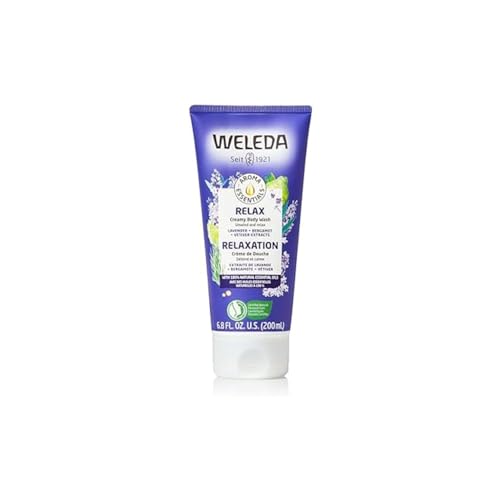
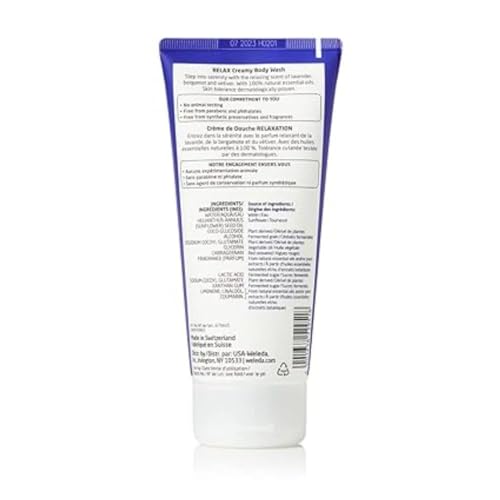
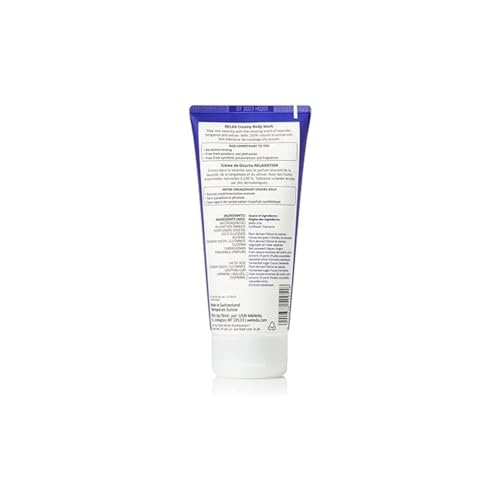
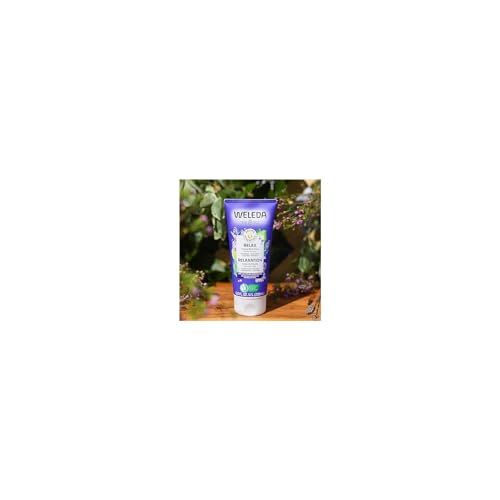
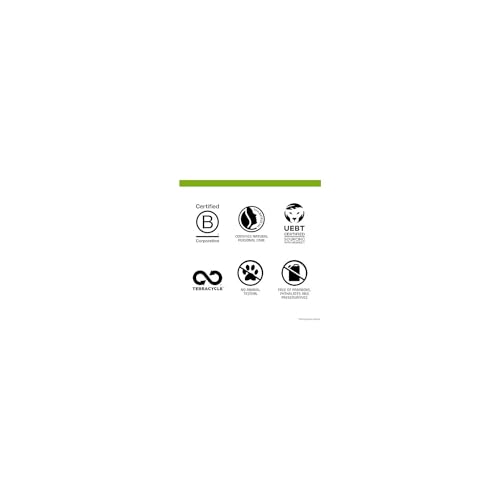
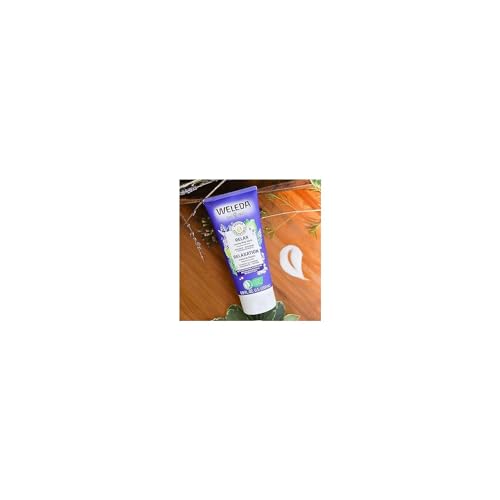
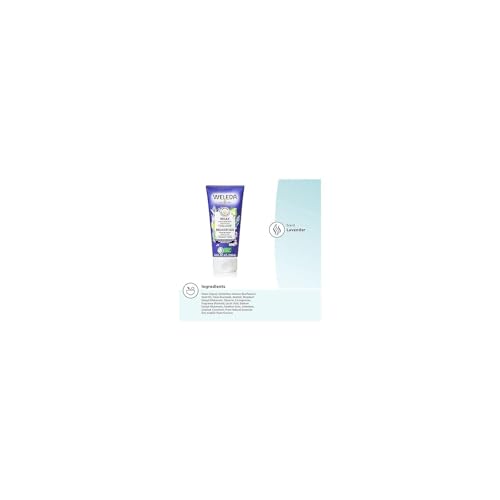
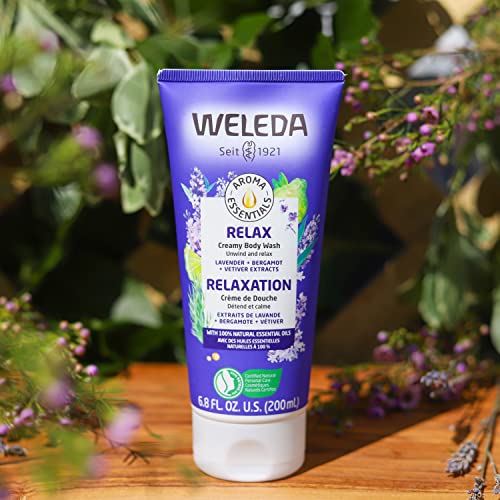
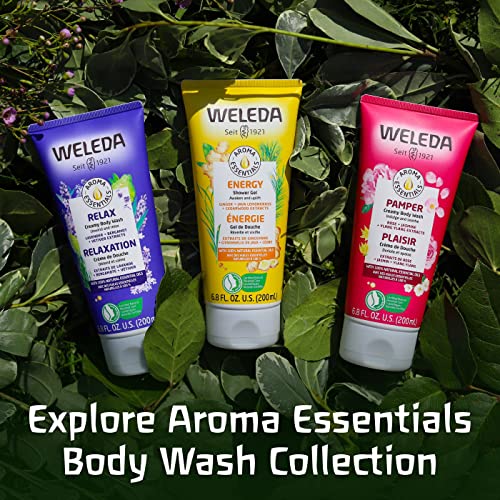
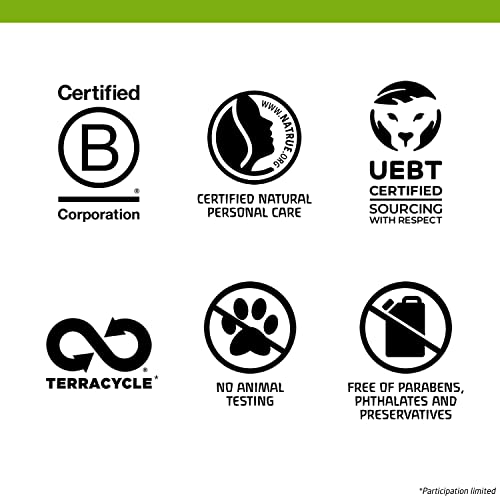
Weleda Aroma Essentials Body Wash - Relaxing Formula, Paraben-Free - 6.8 Fl Oz


Linalool
High RiskLinalool is a terpene commonly found in various plants, particularly in lavender and mint. It is primarily used in products for its fragrance and potential antimicrobial properties. Linalool is also utilized in formulations for its ability to enhance the sensory experience of personal care and household products.
Sustai Insights
Linalool offers functional benefits as a naturally occurring fragrance component and may exhibit antimicrobial properties. However, it presents high allergenic potential, with concerns about skin irritation and sensitization. Environmental risks include contamination issues, though it is not classified as a persistent pollutant. Regulatory bodies have noted the need for careful handling due to its allergenic nature. Overall, despite some beneficial attributes, the ingredient carries a high risk profile, warranting cautious use and consideration of safer alternatives.
Fragrance
High RiskFragrance refers to a mixture of aromatic compounds used in products to provide scent. It is commonly listed as 'fragrance' or 'parfum' on product labels and can serve various functions, including enhancing user experience and masking undesirable odors.
Sustai Insights
Fragrance offers functional benefits by improving product appeal; however, it poses significant health risks, notably a high likelihood of causing allergies and allergic contact dermatitis. Environmental risks include potential pollution and endocrine disruption, though its overall carcinogenicity is low. Regulatory bodies have noted concerns regarding its use, leading to a high-risk classification. Safe usage practices should be observed, and alternatives such as natural essential oils are recommended for those sensitive to synthetic fragrances.
Coumarin
High RiskCoumarin is a naturally occurring and synthetic compound found in many plants. It is commonly used in fragrances, flavorings, and as a potential therapeutic agent due to its aromatic properties. Coumarin has applications in cosmetics and personal care products, contributing to their scent and stability.
Sustai Insights
Coumarin offers functional benefits as a fragrance and flavoring agent, with potential health benefits in certain therapeutic contexts. However, it is associated with high allergenic potential and may pose risks such as skin irritation. Environmental concerns include its classification as a pollutant, with possible bioaccumulation effects. Regulatory bodies have restricted its use in specific products, indicating a moderate to high risk overall. Safe usage practices are advised, and alternatives like natural essential oils could be considered.
Lactic Acid, L
High RiskLactic acid is an organic acid commonly used in cosmetics and skincare products as an exfoliant and pH regulator. It helps in improving skin texture and hydration by promoting the shedding of dead skin cells and enhancing moisture retention.
Sustai Insights
Lactic acid offers functional benefits as an effective exfoliant and moisturizer, contributing to improved skin appearance. However, it poses potential risks, including skin irritation and enhanced absorption, which may lead to adverse effects. Regulatory bodies have noted use restrictions due to these concerns. Overall, the ingredient is considered high risk, necessitating cautious usage, particularly for sensitive skin. Alternatives like glycolic acid may provide similar benefits with potentially lower irritation.
Limonene
Medium RiskLimonene is a scent ingredient and solvent naturally found in citrus fruits, commonly used in personal care and cleaning products for its fragrant properties. It serves as a flavoring agent and enhances the overall sensory experience of products.
Sustai Insights
Limonene offers functional benefits such as acting as a solvent and fragrance enhancer. However, it carries a high allergenic potential, which can trigger skin or respiratory sensitivities in some individuals. Environmental concerns include moderate persistence and bioaccumulation, along with potential ecotoxicity. Regulatory restrictions necessitate verification in products containing this ingredient. Overall, the risk level is assessed as medium, emphasizing the importance of cautious use, particularly for sensitive populations. Safer alternatives may be considered to mitigate these risks.
Helianthus Annuus (Sunflower) Seed
Low RiskHelianthus annuus (sunflower) seed is derived from the seeds of the sunflower plant and is commonly used in various cosmetic and personal care products. It serves primarily as an emollient and skin conditioning agent, providing moisture and enhancing the texture of formulations.
Sustai Insights
Helianthus annuus (sunflower) seed offers functional benefits, including skin conditioning and moisturizing properties, while being sustainably sourced and biodegradable. Health risks are minimal, with low concerns for carcinogenicity, allergies, and reproductive toxicity. Environmentally, it presents low risks of pollution or bioaccumulation. Regulatory assessments indicate no current restrictions. Overall, it is considered a low-risk ingredient, and safe usage practices should be maintained. Alternative ingredients may include other plant-based oils, but the sunflower seed oil remains a viable option.
Chondrus Crispus (Carrageenan)
Low RiskChondrus crispus, commonly known as carrageenan, is a gelatinous polysaccharide derived from red algae. It is primarily used as a thickening, stabilizing, and gelling agent in food, cosmetics, and pharmaceuticals, providing texture and consistency to various products.
Sustai Insights
Carrageenan offers functional benefits such as effective thickening and stabilizing properties, making it valuable in food and cosmetic formulations. It is considered to have low health risk concerns regarding carcinogenicity, allergies, and reproductive toxicity, though moderate concerns exist for non-reproductive organ toxicity. Environmental impacts are minimal, as it is not known to be bioaccumulative or a significant pollutant. Regulatory bodies have not issued specific restrictions against its use, affirming a low overall risk assessment for this ingredient. Alternatives like agar-agar or pectin may be considered for those seeking substitutes.
Water
Low RiskWater is a clear, colorless liquid essential for various biological processes. It serves as a solvent in formulations, facilitating the dissolution of other ingredients and enhancing product texture and application. Additionally, water plays a crucial role in hydration and is a key component in many cosmetic and personal care products.
Sustai Insights
Water is an effective solvent and hydrator, contributing to the texture and efficacy of formulations. It is biodegradable and generally regarded as safe, with low concerns regarding carcinogenicity, allergies, and reproductive toxicity. However, excessive water usage can lead to environmental concerns, particularly regarding resource depletion. Regulatory bodies do not impose restrictions on water use in cosmetics. Overall, the risks associated with water are low, making it a safe and essential ingredient.
Vegetarian Glycerin
Low RiskVegetarian glycerin, also known as glycerol, is a colorless, odorless, and viscous liquid derived from plant sources. It is primarily used as a humectant, solvent, and emollient in various personal care products, helping to retain moisture and improve texture.
Sustai Insights
Vegetarian glycerin offers functional benefits as an effective humectant, promoting hydration and skin smoothness. It is biodegradable and typically sustainably sourced. Health risks associated with glycerin are low, with no significant concerns for carcinogenicity, allergens, or reproductive toxicity. Environmental risks are minimal, and it is not subject to major regulatory warnings. Overall, the risk level for this ingredient is low, making it a safe choice in formulations. Safe usage practices include ensuring proper concentrations in products, and alternatives such as propylene glycol exist but may have differing properties.
Monosodium Glutamate
Low RiskMonosodium glutamate (MSG) is the monosodium salt of glutamic acid, an amino acid naturally found in various foods. It is primarily used as a flavor enhancer in food products, providing umami taste, which is one of the five basic tastes alongside sweet, sour, bitter, and salty.
Sustai Insights
Monosodium glutamate offers functional benefits as a flavor enhancer, effectively improving taste in various dishes. It is considered low risk regarding carcinogenicity, allergies, and reproductive toxicity, with no significant environmental hazards reported. Regulatory bodies, including the FDA, recognize its safe use. Despite common misconceptions linking MSG to adverse health effects, scientific consensus supports its safety at typical consumption levels. Therefore, the overall risk associated with monosodium glutamate is low, and it can be safely used in food products.
Xanthan Gum
Low RiskXanthan gum is a polysaccharide, a sugar-based compound produced by the fermentation of glucose or sucrose. It is commonly used as a thickening agent and stabilizer in various food and cosmetic products due to its ability to improve texture and prevent ingredient separation.
Sustai Insights
Xanthan gum serves effectively as a thickener and stabilizer, enhancing product texture and consistency. It is biodegradable and typically derived from renewable sources, supporting sustainability efforts. Health risks are minimal, with low concerns regarding carcinogenicity, allergies, and reproductive toxicity. Environmental impact is similarly low, posing no significant hazards. Regulatory agencies, including the FDA, regard it as safe for use, with no significant restrictions. Overall, xanthan gum is assessed as low risk, making it a suitable ingredient in formulations.
Sodium Cocoyl Glutamate
Low RiskSodium cocoyl glutamate is a sodium salt of glutamic acid, derived from coconut oil. It serves primarily as a surfactant and mild cleansing agent in cosmetic formulations, contributing to the product's ability to remove dirt and oil while being gentle on the skin.
Sustai Insights
Sodium cocoyl glutamate offers functional benefits as a surfactant, enhancing cleansing efficacy without excessive irritation. It is considered low risk regarding health concerns, including carcinogenicity and allergenic potential. Regulatory assessments indicate no significant environmental hazards or restrictions. Overall, it is a low-risk ingredient, suitable for use in personal care products, with no notable adverse effects or regulatory warnings.
Helianthus Annuus (Sunflower) Seed
Low RiskHelianthus annuus (sunflower) seed is derived from the seeds of the sunflower plant and is commonly used in various cosmetic and personal care products. It serves primarily as an emollient and skin conditioning agent, providing moisture and enhancing the texture of formulations.
Sustai Insights
Helianthus annuus (sunflower) seed offers functional benefits, including skin conditioning and moisturizing properties, while being sustainably sourced and biodegradable. Health risks are minimal, with low concerns for carcinogenicity, allergies, and reproductive toxicity. Environmentally, it presents low risks of pollution or bioaccumulation. Regulatory assessments indicate no current restrictions. Overall, it is considered a low-risk ingredient, and safe usage practices should be maintained. Alternative ingredients may include other plant-based oils, but the sunflower seed oil remains a viable option.
Chondrus Crispus (Carrageenan)
Low RiskChondrus crispus, commonly known as carrageenan, is a gelatinous polysaccharide derived from red algae. It is primarily used as a thickening, stabilizing, and gelling agent in food, cosmetics, and pharmaceuticals, providing texture and consistency to various products.
Sustai Insights
Carrageenan offers functional benefits such as effective thickening and stabilizing properties, making it valuable in food and cosmetic formulations. It is considered to have low health risk concerns regarding carcinogenicity, allergies, and reproductive toxicity, though moderate concerns exist for non-reproductive organ toxicity. Environmental impacts are minimal, as it is not known to be bioaccumulative or a significant pollutant. Regulatory bodies have not issued specific restrictions against its use, affirming a low overall risk assessment for this ingredient. Alternatives like agar-agar or pectin may be considered for those seeking substitutes.
Water
Low RiskWater is a clear, colorless liquid essential for various biological processes. It serves as a solvent in formulations, facilitating the dissolution of other ingredients and enhancing product texture and application. Additionally, water plays a crucial role in hydration and is a key component in many cosmetic and personal care products.
Sustai Insights
Water is an effective solvent and hydrator, contributing to the texture and efficacy of formulations. It is biodegradable and generally regarded as safe, with low concerns regarding carcinogenicity, allergies, and reproductive toxicity. However, excessive water usage can lead to environmental concerns, particularly regarding resource depletion. Regulatory bodies do not impose restrictions on water use in cosmetics. Overall, the risks associated with water are low, making it a safe and essential ingredient.
Linalool
High RiskLinalool is a terpene commonly found in various plants, particularly in lavender and mint. It is primarily used in products for its fragrance and potential antimicrobial properties. Linalool is also utilized in formulations for its ability to enhance the sensory experience of personal care and household products.
Sustai Insights
Linalool offers functional benefits as a naturally occurring fragrance component and may exhibit antimicrobial properties. However, it presents high allergenic potential, with concerns about skin irritation and sensitization. Environmental risks include contamination issues, though it is not classified as a persistent pollutant. Regulatory bodies have noted the need for careful handling due to its allergenic nature. Overall, despite some beneficial attributes, the ingredient carries a high risk profile, warranting cautious use and consideration of safer alternatives.
Vegetarian Glycerin
Low RiskVegetarian glycerin, also known as glycerol, is a colorless, odorless, and viscous liquid derived from plant sources. It is primarily used as a humectant, solvent, and emollient in various personal care products, helping to retain moisture and improve texture.
Sustai Insights
Vegetarian glycerin offers functional benefits as an effective humectant, promoting hydration and skin smoothness. It is biodegradable and typically sustainably sourced. Health risks associated with glycerin are low, with no significant concerns for carcinogenicity, allergens, or reproductive toxicity. Environmental risks are minimal, and it is not subject to major regulatory warnings. Overall, the risk level for this ingredient is low, making it a safe choice in formulations. Safe usage practices include ensuring proper concentrations in products, and alternatives such as propylene glycol exist but may have differing properties.
Fragrance
High RiskFragrance refers to a mixture of aromatic compounds used in products to provide scent. It is commonly listed as 'fragrance' or 'parfum' on product labels and can serve various functions, including enhancing user experience and masking undesirable odors.
Sustai Insights
Fragrance offers functional benefits by improving product appeal; however, it poses significant health risks, notably a high likelihood of causing allergies and allergic contact dermatitis. Environmental risks include potential pollution and endocrine disruption, though its overall carcinogenicity is low. Regulatory bodies have noted concerns regarding its use, leading to a high-risk classification. Safe usage practices should be observed, and alternatives such as natural essential oils are recommended for those sensitive to synthetic fragrances.
Limonene
Medium RiskLimonene is a scent ingredient and solvent naturally found in citrus fruits, commonly used in personal care and cleaning products for its fragrant properties. It serves as a flavoring agent and enhances the overall sensory experience of products.
Sustai Insights
Limonene offers functional benefits such as acting as a solvent and fragrance enhancer. However, it carries a high allergenic potential, which can trigger skin or respiratory sensitivities in some individuals. Environmental concerns include moderate persistence and bioaccumulation, along with potential ecotoxicity. Regulatory restrictions necessitate verification in products containing this ingredient. Overall, the risk level is assessed as medium, emphasizing the importance of cautious use, particularly for sensitive populations. Safer alternatives may be considered to mitigate these risks.
Monosodium Glutamate
Low RiskMonosodium glutamate (MSG) is the monosodium salt of glutamic acid, an amino acid naturally found in various foods. It is primarily used as a flavor enhancer in food products, providing umami taste, which is one of the five basic tastes alongside sweet, sour, bitter, and salty.
Sustai Insights
Monosodium glutamate offers functional benefits as a flavor enhancer, effectively improving taste in various dishes. It is considered low risk regarding carcinogenicity, allergies, and reproductive toxicity, with no significant environmental hazards reported. Regulatory bodies, including the FDA, recognize its safe use. Despite common misconceptions linking MSG to adverse health effects, scientific consensus supports its safety at typical consumption levels. Therefore, the overall risk associated with monosodium glutamate is low, and it can be safely used in food products.
Xanthan Gum
Low RiskXanthan gum is a polysaccharide, a sugar-based compound produced by the fermentation of glucose or sucrose. It is commonly used as a thickening agent and stabilizer in various food and cosmetic products due to its ability to improve texture and prevent ingredient separation.
Sustai Insights
Xanthan gum serves effectively as a thickener and stabilizer, enhancing product texture and consistency. It is biodegradable and typically derived from renewable sources, supporting sustainability efforts. Health risks are minimal, with low concerns regarding carcinogenicity, allergies, and reproductive toxicity. Environmental impact is similarly low, posing no significant hazards. Regulatory agencies, including the FDA, regard it as safe for use, with no significant restrictions. Overall, xanthan gum is assessed as low risk, making it a suitable ingredient in formulations.
Sodium Cocoyl Glutamate
Low RiskSodium cocoyl glutamate is a sodium salt of glutamic acid, derived from coconut oil. It serves primarily as a surfactant and mild cleansing agent in cosmetic formulations, contributing to the product's ability to remove dirt and oil while being gentle on the skin.
Sustai Insights
Sodium cocoyl glutamate offers functional benefits as a surfactant, enhancing cleansing efficacy without excessive irritation. It is considered low risk regarding health concerns, including carcinogenicity and allergenic potential. Regulatory assessments indicate no significant environmental hazards or restrictions. Overall, it is a low-risk ingredient, suitable for use in personal care products, with no notable adverse effects or regulatory warnings.
Coumarin
High RiskCoumarin is a naturally occurring and synthetic compound found in many plants. It is commonly used in fragrances, flavorings, and as a potential therapeutic agent due to its aromatic properties. Coumarin has applications in cosmetics and personal care products, contributing to their scent and stability.
Sustai Insights
Coumarin offers functional benefits as a fragrance and flavoring agent, with potential health benefits in certain therapeutic contexts. However, it is associated with high allergenic potential and may pose risks such as skin irritation. Environmental concerns include its classification as a pollutant, with possible bioaccumulation effects. Regulatory bodies have restricted its use in specific products, indicating a moderate to high risk overall. Safe usage practices are advised, and alternatives like natural essential oils could be considered.
Lactic Acid, L
High RiskLactic acid is an organic acid commonly used in cosmetics and skincare products as an exfoliant and pH regulator. It helps in improving skin texture and hydration by promoting the shedding of dead skin cells and enhancing moisture retention.
Sustai Insights
Lactic acid offers functional benefits as an effective exfoliant and moisturizer, contributing to improved skin appearance. However, it poses potential risks, including skin irritation and enhanced absorption, which may lead to adverse effects. Regulatory bodies have noted use restrictions due to these concerns. Overall, the ingredient is considered high risk, necessitating cautious usage, particularly for sensitive skin. Alternatives like glycolic acid may provide similar benefits with potentially lower irritation.
Experience the soothing touch of Weleda Aroma Essentials Relax Creamy Body Wash. This paraben-free body wash nourishes your skin while enveloping you in calming aromas, perfect for a relaxing bath experience.
- Gentle Cleansing: Enriched with natural ingredients like sunflower seed oil and coconut-based cleansers, it effectively cleanses without stripping moisture.
- Aromatherapy Benefits: Infused with essential oils, it promotes relaxation and tranquility during your shower or bath, enhancing your self-care routine.
- Eco-Friendly Choice: Crafted with sustainable practices in mind, this body wash reflects an eco-conscious lifestyle, appealing to environmentally-aware consumers.
- Hydration Boost: The creamy formula helps maintain skin hydration, making it ideal for daily use and leaving skin soft and supple.
- User-Friendly Application: Easy to use—simply lather, rinse, and follow with your favorite moisturizer for optimal results.
Trust Weleda's commitment to quality and sustainability, backed by customer reviews that highlight its effectiveness and gentle nature.
Subscribe & Save with Sustai
- Best Price Guarantee: Always enjoy the lowest prices on sustainable home essentials.
- No Surprises: We’ll notify you before shipping. No hidden fees, ever.
- You’re in Charge: Change, pause, or cancel your subscription anytime with ease.
- Eco-Friendly Deliveries: Our grouped shipments mean less packaging and lower emissions.
Join us on a sustainable journey. Special offers for a limited time! Prices and promotions may change.
Recommended Products
Experience the soothing touch of Weleda Aroma Essentials Relax Creamy Body Wash. This paraben-free body wash nourishes your skin while enveloping you in calming aromas, perfect for a relaxing bath experience.
- Gentle Cleansing: Enriched with natural ingredients like sunflower seed oil and coconut-based cleansers, it effectively cleanses without stripping moisture.
- Aromatherapy Benefits: Infused with essential oils, it promotes relaxation and tranquility during your shower or bath, enhancing your self-care routine.
- Eco-Friendly Choice: Crafted with sustainable practices in mind, this body wash reflects an eco-conscious lifestyle, appealing to environmentally-aware consumers.
- Hydration Boost: The creamy formula helps maintain skin hydration, making it ideal for daily use and leaving skin soft and supple.
- User-Friendly Application: Easy to use—simply lather, rinse, and follow with your favorite moisturizer for optimal results.
Trust Weleda's commitment to quality and sustainability, backed by customer reviews that highlight its effectiveness and gentle nature.

You can have at most 2 Sustainable Steals products in your cart
Customer Reviews
Customers’ View
Customers appreciate the soothing and luxurious experience provided by the Aroma Essentials Relax Body Wash. Many highlight the delightful scent, particularly enjoying its calming lavender aroma, which adds a touch of luxury to their shower routine. Users frequently mention the product's moisturizing properties, noting that it leaves their skin feeling soft and hydrated without drying it out. The creamy texture and gentle cleansing qualities are also commended, making it suitable for daily use on various skin types. While there are some concerns regarding the product's value for money due to its smaller size, the overall sentiment leans towards satisfaction with the quality and natural ingredients, which align well with eco-friendly and health-conscious values. Overall, customers find this body wash effective and soothing, reinforcing its appeal for those seeking a relaxing bathing experience.
AI-generated from the text of customer reviewsThis product is rated 4.8 of 5.0 stars.
It has received 14 reviews.




